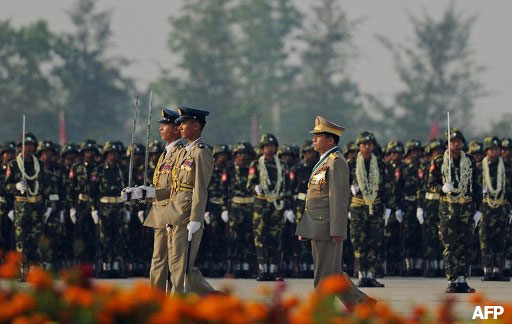Burma’s top military boss says the Tatmadaw (armed forces) have a duty to play a political role and to guard the junta-drafted Constitution, in remarks during the 67th Armed Forces Day parade on Tuesday in Naypyitaw.
 General Min Aung Hlaing said the government-appointed, unelected military representatives sitting as Members of Parliament are acting “in the national interest” and “just performing a national political duty.”
General Min Aung Hlaing said the government-appointed, unelected military representatives sitting as Members of Parliament are acting “in the national interest” and “just performing a national political duty.”
He said the Tatmadaw plays a leading role in the national politics of the country while speaking to about 13,000 troops on the day that marks the uprising of Burmese soldiers against the Japanese in 1945 towards the end of World War II.
“Our Tatmadaw has to respect and obey as well as preserve the state Constitution, which is the same as our country's life, together with all nationals,” Min Aung Hlaing said. “Our Tatmadaw will protect and maintain the Constitution as its main duty while building a new modern and developed democratic nation.”
Min Aung Hlaing became the acting joint chief of staff of the army, navy, and air force in June 2010 and is now the General Commander-in-Chief of Burmese Armed Forces. At 54 years old, he is considered to be among a new breed of military officer. He has a reputation as a brave fighter with a scholarly bent, and a no-nonsense straight talker.
Unlike past Armed Forces Day parades, it was a low-key ceremony with about 400 officials and guests. President Thein Sein, a former general, did not attend.
The Burmese army has always been by far the largest service and has always received the lion's share of the defence budget. It has played the most prominent part in Burma's war against the 40 or more insurgent groups since 1948 and acquired a reputation as a tough and resourceful military force, according to military analysts.
In 1981, it was described as “probably the best [army] in Southeast Asia, apart from Vietnam's.” The judgment was echoed in 1983, when another observer noted that "Myanmar's infantry is generally rated as one of the toughest, most combat seasoned in Southeast Asia.”
An 83-page report released this month by Human Rights Watch, “‘Untold Miseries’: Wartime Abuses and Forced Displacement in Burma’s Kachin State,” describes how the Burmese army has attacked Kachin villages, razed homes, pillaged properties, and forced the displacement of tens of thousands of people. Soldiers have threatened and tortured civilians during interrogations and raped women. The army has also used antipersonnel mines and conscripted forced laborers, including children as young as 14, on the front lines, according to the report.



